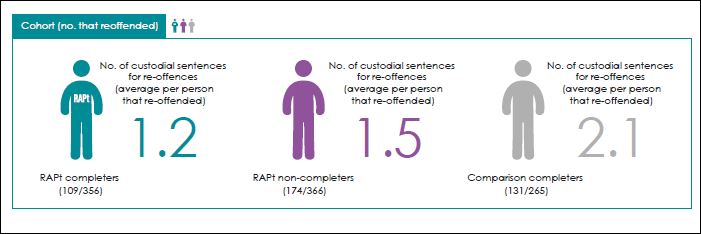Intensive prison based drug and alcohol treatment
The prison drug treatment charity RAPt recently (12 May 2015) launched a series of briefings on a range of issues around drug-related crime. The briefings are based on the organisation’s experience but also on a large database of over 6000 drug and alcohol dependent offenders who have participated in RAPt’s intensive prison treatment programmes
The third briefing is entitled “A successful approach to tackling drug-related crime” and picks up the theme of the first briefing – that the key to reducing reoffending is to provide effective treatment to the large number of offenders whose crime is driven by their dependence on drugs and/or alcohol.
[divider]
The Rapt programme
The briefing describes the RAPt Substance Dependence Treatment Programme (SDTP) which is an intensive, full-time, 16-21 week programme for prisoners. The SDTP begins with Motivational Enhancement Therapy and Cognitive Behavioural Therapy skills training and is then followed by completion of steps 1-5 of NA/AA’s 12-Steps. It also includes Group Therapy and individual counselling throughout. Programme graduates play a key role in the delivery of the programme, as volunteer ‘Peer Supporters’, and, eventually, some progress to become Apprentices or paid staff.
[divider]
The outcomes
What makes the SDTP particularly interesting is that it has been subjected to a comprehensive evaluation with the reoffending of programme graduates compared with those who start, but do not complete the programme, and a comparison group of prisoners who completed the standard “in-house” prison drug treatment programme – known as the “Short Duration Programme”.
The evaluation, which use standard Police National Computer records to measure reconvictions, found that far fewer SDTP graduates reoffended, and that those who did, committed fewer, unless serious offences as the graphics below show:
Conclusion
These are outstanding outcomes and demonstrate the importance of a recovery-oriented treatment approach as a long term solution to tackling drug-related crime; interestingly, reconviction rates for RAPt graduates go down further in the second year post-release.
Unfortunately, less than 2% of the prison population who currently need this sort of intensive intervention is receiving it. It remains to be seen if Michael Gove, the new Justice Secretary, can improve on that figure.
In the interests of transparency, it should be noted that Russell contributed to the development of this briefing alongside several RAPt employees.











